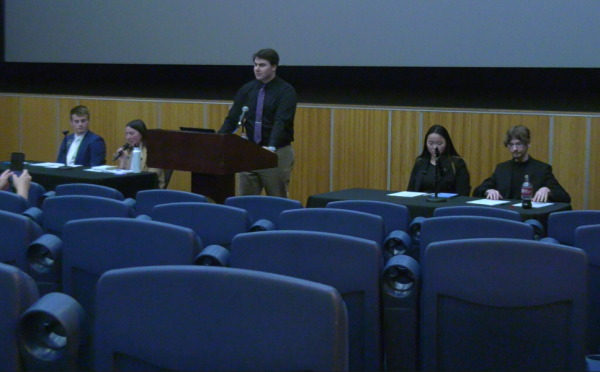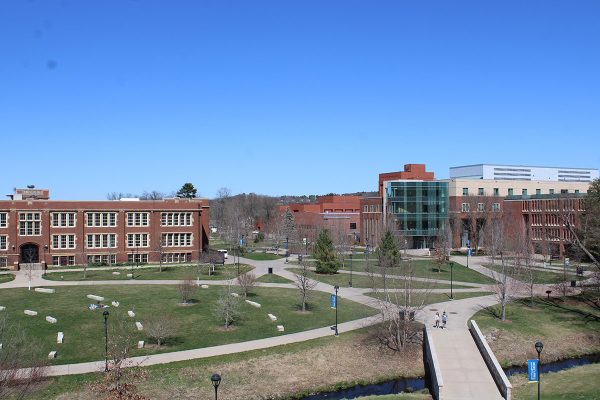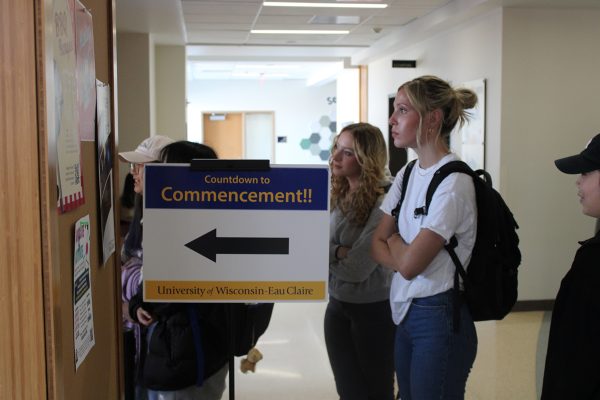Reaching out
Panel discussion on sexual assault took place in Davies on Monday
April 9, 2014
Sexual assault happens everywhere, but one place where assault seems more prevalent is college campuses.
Monday, Sexual Assault on College Campuses, a panel discussion, featuring Amanda Leiknes, director of the Center for Awareness and Sexual Assault Victim Services and Chris Jorgenson, Women’s and LGBTQ Resource Center coordinator gathered UW-Eau Claire students and the community in a small room on the third floor of Davies to talk about sexual assault.
“April is sexual assault month, so it’s good timing, and I think a lot of people just generally have questions about what we are doing on campus as far as intervention and prevention,” Leiknes said.
She said especially on college campuses, alcohol is a big factor in sexual assault. To help combat assault, Leiknes and Jorgenson both suggested at the panel that students look out for one another when alcohol is involved.
“I think the most important part of prevention of sexual assault starts with education, and awareness of the reality of how sexual assault is happening in your own community,” Leiknes said.
Jorgenson said many times students partake in bystander intervention without even knowing. Bystander intervention is as easy as going up to someone and giving them a possible out, he said.
According to Leiknes, 5 percent of rapes are reported and 84 percent of male perpetrators believe what they did was not rape. While sexual assault can happen to both males and females, 98 percent of perpetrators are male.
At the panel, Jorgenson brought up how people need to become better educated about sexual assault. He said he wants to make sure people know what consent is, because if you can’t define it, you can’t give it.
Sophomores Katie Ruff and Monica Weltzien came to the discussion for a class, but left glad they went.
“I was really interested in it, it as something people don’t know about,” Weltzien said. “I work for CASE and the amount of stuff we hear in there makes me think there is a problem especially on our campus.”
Ruff said the panel focused well on the resources we have on the Eau Claire campus.
“I don’t think a lot of people know about it, so I think awareness needs to be a big deal here,” Ruff said.
Also at the panel were Eau Claire Housing and Residence Life associate director, Deborah Newman and Dean of Students Joe Abhold. Both spoke about the care they take for students when they find out that a student has been sexually assaulted. Newman said if a student wishes to move dorms because of an assault, they have been able to do that within a day.
Abhold said the school does not usually expel students, but they would take into consideration suspending a student for engaging in sexual assault.
Jorgenson said he wanted people who attended the event to be more comfortable seeking help if they need it and to know where to get it.
“Even as simple as putting faces to the issues of sexual assault can be helpful, if people know who to go to, my face, even my name, the more we have conversation like this the better, we can’t talk about it enough,” Jorgensen said.
If regards to talking about rape culture, Jorgenson said being comfortable with the topic is not the goal.
“What happens when people feel discomfort is they want to make it comfortable right away and that’s either by avoiding the conversation or making it sound better than it is,” Jorgensen said. “I think the goal is to feel that discomfort, to talk through it, so that we can really have a honest discussion about the messages that we receive and perpetuate.”
If you or someone you know has been sexually assaulted, or has questions about an experience, Leiknes said students can set up an appointment at CASA by phone, email or just stopping in.










